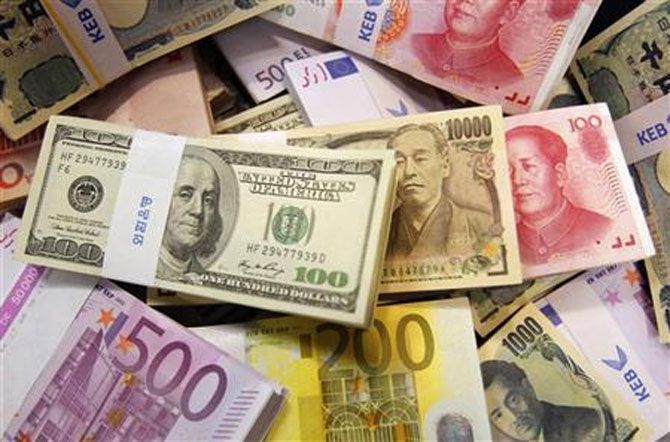Though Narendra Modi doesn't know it, he is a victim of this deep-rooted infection. He wants efficient markets and strong regulation as well as a huge public sector presence in the financial and manufacturing sectors, notes T C A Srinivasa-Raghavan.
 Exactly seven years ago, in September 2008, the global financial system as the world had known it since the late 1970s collapsed on itself. Reason: untrammelled greed on the part of the West, governments included.
Exactly seven years ago, in September 2008, the global financial system as the world had known it since the late 1970s collapsed on itself. Reason: untrammelled greed on the part of the West, governments included.
Since then all manner of diverse thinkers - finance specialists, economists, sociologists, political 'scientists' and psychologists - have been trying to figure out what went wrong with their disciplines.
How could their specialised structures of thought have not allowed for this, or if it did, adequately so?
The deepest in thought have been the economists. As well they might.
They had elevated greed and even fraud to the status of divine dispensation.
Their labours, so far as I can see, have produced two very similar molecules of curative medicine. One is basically administrative in nature - the let's-have-more-regulation of the markets strain; the other is deeply political - the inequality and its discontents strain. Both assign a central role to the state. Neither has anything much to do with the market.
That kind of thinking, for the moment at least, seems to be on life-support and economics, as we knew it since Paul Samuelson, Kenneth Arrow and Gerard Debreu built its seemingly unshakable foundations, has taken a deep breath and dived 60 fathoms deep.
The regulatory molecule Most of the things that the economists of the Western Hemisphere are now talking about have been discussed in India since 1900 and practised since 1947. But if you read and listen to the Westerners, you would think they are the first to think of it.
To see what Indian economic thinking was before Independence, students all over the world and failing that, at least in India, should be made to read J Krishnamurty's classic work Towards Development Economics in which he summarised Indian economic thought between 1900 and 1945. Equity was the undertow there, just as it has become so now in the West.
Thomas Piketty in his book on inequality, doesn't refer to the Indian experience even once, just as Valery Giscard d'Estaing never referred to the Indian Constitution while drawing up the European one in 2002.
That project came to grief. And as to how to practise economics, the students should be made to read the Reserve Bank of India's history volumes - if only because it is the only place where these things can be found.
The West's economists are now claiming all of this as 'new' thinking.
Utter rubbish. Strong regulation - by government or community - has always been a major tenet of Indian tradition whether ancient or modern.
It has never given greed a central place in economic activity. The sovereign has always been tasked with tempering it.
It was the British who altered this mode of thought because it curbed their greed.
But consistent with their overall policy of double standards, in Britain they regulated their businesses very strongly. The Americans have done the same thing.
They have regulated their own markets very strongly while pressing for loose regulation in other parts of the world.
The political molecule
Only the ignorant don't grasp the fact that if you allow both empowerment and inclusion, politics becomes an integral part of all social policy.
But economists pretend that this basic social law can be avoided. In this they are unique.
It's like engineers ignoring the laws of physics. They will surely build something but will it work? Indian economists, at least until the late 1990s, implicitly recognised the importance of politics in economics.
When you look at the writings of the pre-1991 era, it is evident that they had a very clear sense of what would work politically and what would not. And - Western economists should note - the undertow here was income distribution or what is the same thing, inequality.
In their theorising as well as in their prescriptions, they never forgot the basic objectives of India's economic policies.
This came to be called Left economics.
But that was a misnomer. Left economics of that time meant state ownership.
It did not mean strong regulation of efficient markets, which is what the economists of that era wanted.
The problem arose in the 1970s.
Indira Gandhi destroyed pretty much everything in her path - including the distinction I have made above.
The Modi molecule
The social polarisation we blame the BJP for had been preceded by the intellectual polarisation that Indira Gandhi fostered and encouraged.
And though Narendra Modi doesn't know it, he is a victim of this deep-rooted infection.
He wants efficient markets and strong regulation as well as a huge public sector presence in the financial and manufacturing sectors.
But here, as elsewhere, three is a crowd where public ownership is the odd man out.










 © 2025
© 2025